Anthony Price, journalist, critic and award-winning writer
of spy fiction, died on 30th May aged 90. Mike Ripley remembers his
contribution to the genre.
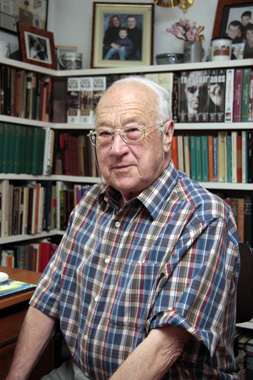
Anthony Price in 2011
Picture credit: Nick Jones, Existential Ennui.
Long
before I met Anthony Price I knew his name, as favourable quotes from his
reviews in The Oxford Mail often
appeared on the covers of the paperbacks I devoured in the Sixties and
Seventies. He was clearly at fan, as was I, of the thrillers of Berkely Mather,
Len Deighton, John Le Carré and Alistair MacLean among many others. Then, in
1979, I discovered that he wrote spy stories – bloody good ones – almost by
accident and nine years late.
My
wife and I were at Heathrow waiting for our flight to Chicago when I realised I
had forgotten to pack a book for the journey. In the airport bookshop I spotted
a small selection of Futura paperbacks by Anthony Price and the name rang a bell. The cover of one, The Alamut Ambush, caught my eye and
I made a hurried purchase. I finished it as our plane came into land at O’Hare.
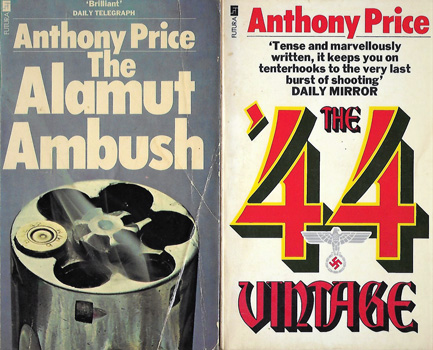
Our
return to England coincided with the paperback edition of The ’44 Vintage, which
cemented Price’s reputation as a master story-teller, not that it really needed
cementing as by then his novels had already won him a Gold and a Silver Dagger
and the Martin Beck Award from the Swedish Crime Writers’ Academy. I read it,
was hooked, and immediately tracked down his backlist, which was not, in those
pre-internet days, very easy (I remember it took me ages to find October
Men) and from then on bought every novel he published in hardback
because I couldn’t wait for the paperback.
Almost
a decade later, in August 1988, my first novel was published and in September
my publisher arranged for my debut public appearance as a crime writer at an
event at Hatchard’s bookshop in Kensington. It was only when I saw the
programme on the night, that I realised that I was basically the ‘warm-up’ man
for the star of the evening: Anthony Price.
They
say you should never meet your heroes, but don’t believe it. Anthony could not
have been more charming to his audience, nor more encouraging to a fledgling
writer and I still have the copy of A Prospect of Vengeance he signed
for me on the night.
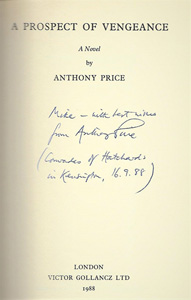
*
Alan
Anthony Price was born in 1928 in Hertfordshire and attended the Kings School
in Canterbury where he won an Exhibition scholarship to Oxford, reading history
at Merton College after National Service (1947-49) first in the Royal Signals
then in the Educational Corps where he was commissioned and gained the rank of
Captain.
Graduating
from Oxford he stayed in the town as a journalist with The Oxford Times, which he would eventually come to edit. As a cub
reporter in the early 1950s, the editor of sister paper The Oxford Mail asked if he fancied reviewing a book, the caveat
being “It’s only a children’s book, but the author is local”.
That
local author turned out to be J.R.R. Tolkien and Price was to be the first
journalist to interview him about The
Fellowship of the Ring (he is said to have liked the novel but hated the
poetry in it).
Book
reviewing became a regular habit, with Price specialising in crime and thriller
fiction and his literary editor and great friend Brian Aldiss handling the
science fiction. As a reviewer he paid the same respect to the thriller that
many national newspaper reviewers reserved only for traditional detective
stories. This was, after all, the decade of Ian Fleming and Alistair MacLean,
both of whom Price rated highly, even if he did point out that, as a villain,
Dr No was thirty years out of date and belonged more to the era of Fu Manchu.
In
the Sixties, he welcomed the work of Len Deighton, John Le Carré, Gavin Lyall
and Berkely Mather with enthusiasm and his reputation as a reviewer was such
that in 1968 publisher Livia Gollancz asked him to write a history of the crime
novel. That, he decided, sounded far too much like hard work, but he did have
an idea for a novel which Gollancz might be interested in. They were.
That
debut novel, The Labyrinth Makers, published in 1970, won the Crime Writers’
Association’s Silver Dagger (there was no award for best first novel in those
days) and was declared “Excellent” by both Edmund Crispin and Marghanita Laski.
It introduced two characters, Dr David Audley and Colonel Jack Butler, who were
to become stalwart figures in most of his nineteen novels over the next
nineteen years, each one rich in historical themes and tortuous Cold War
espionage plots.
In
fact the military history elements of the books, which could include Roman
legions on Hadrian’s Wall, the location of King Arthur’s Camelot and naval
warfare at the time of Nelson, were essentially long (and very entertaining)
shaggy-dog stories, used as red herrings to divert and fool the characters and
the reader. The ‘spy-fi’ part of the plot often tied up in a sudden burst of
action right at the end. It was a unique technique for telling his stories and
Price developed a distinctive writing ‘voice’. There was, and is, nothing in
crime fiction quite like an Anthony Price.
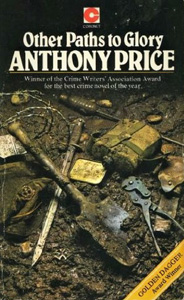
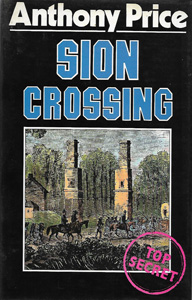
His
genuine interest in military history shone through all his books and his
research was never less than thorough. For Other Paths To Glory, which won him
the Crime Writers’ Association’s Gold Dagger in 1974, he had not only visited
First World war battlefields in Europe (before they were opened up to
commercial tourist trips), but had conducted taped interviews with many WWI
veterans from the Oxford area. Similarly, for Sion Crossing (1984), he
visited American Civil War battlefields in South Carolina and Georgia and
although his own military experience had been after the Second World War, he
tackled aspects of that conflict in outstanding thriller such as The
Hour of the Donkey (Dunkirk) and Here Be Monsters (D-Day).
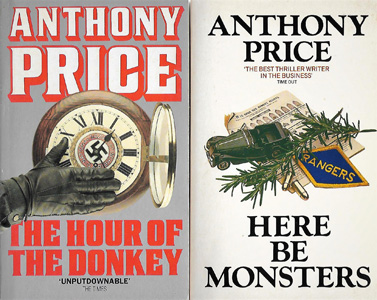
Price
even managed, in A New Kind of War (1987), ostensibly set in Greece and Germany
in 1944-45, to introduce a sub-plot red herring relating to the defeat of three
Roman Legions by Germanic tribes in the Teutoburg Forest in AD9, known as the
‘Varian disaster’ after the unfortunate Roman general Varus.
In
a 2011 interview with Nick Jones for the website Existential Ennui, he admitted that he had always fancied writing a
‘big Roman historical novel, like Lindsey Davis’ but he had in fact written an
outstanding short story, The Boudicca
Killing, about an outrageous scam conducted in Roman Britain in AD60.
*
Anthony’s
novels continued to wow the critics and inevitably attracted the attention of
television producers. In 1983, Granada produced a series entitled Chessgame based on his novels, with a
mis-cast Terence Stamp as Dr David Audley. Price himself called the series
‘dreadful’ and would, late in life, claim that Terence Stamp never worked in
television again following the experience, (though that is not technically
accurate).
He
continued to review crime novels and thrillers for the Oxford Mail, one of his favourites being Tinker Tailor Soldier Spy,
which his Other Paths To Glory beat to the Gold Dagger in 1974. He was
possibly the first reviewer to note the similarities between Jack Higgins’ 1975
bestseller The Eagle Has Landed and the morale-boosting wartime film Went the Day Well? but concluded that
‘it doesn’t really spoil a vintage Alistair MacLean-style thriller.’
And
then, coinciding with the publication of his nineteenth novel The
Memory Trap in 1989, Anthony announced his retirement. It was also,
coincidentally, the year in which the Berlin Wall came down and Anthony had
been one of a quartet of noted writers (the others being Eric Ambler, Julian
Symons and Reginald Hill) posing in front of that iconic symbol of the Cold War
for a famous photograph by Jane Bown.
Anthony’s
retirement, not just from the editorship of the Oxford Times, and as a reviewer for the Oxford Mail, extended to his retirement from writing full stop. There
were howls of dismay from readers and numerous attempts by his editors at
Gollancz to make him reconsider, but he was adamant.
There
was even a plot hatched to persuade Anthony back into the crime writing fold. Masterminded
by Tim Binyon, crime reviewer and author as well as Russian scholar, the plan
was to organise a private crime fiction ‘seminar’ involving only himself, me,
Colin Dexter, Michael Dibdin and, as the object of the exercise, Anthony Price.
It would be held in the extensive wine cellars of Wadham College, Oxford, to
which Tim Binyon claimed he had access. Mercifully, for the college’s famous
reserves of claret, the plot never materialised.
Oddly,
for a journalist, Anthony never enjoyed the publicity side of being an author,
though he was an engaging public speaker, lecturing for the British Council
abroad until his retirement.
His
novels were perhaps cursed with the description “ingenious” (an adjective used
by The Times, Sunday Telegraph, The Guardian and Evening Standard) which perhaps put off a mass popular audience,
but for the connoisseur of spy fiction, they were like nothing else before or
since and it is a mystery why he was never awarded the Diamond Dagger for
lifetime achievement.
Beneath
their Cold (or ‘hot’) War plots, they were tense, intelligent, witty and
peopled with credible characters, and they always came with a historical
sub-text, for Anthony Price always felt the past was lying in wait for the
present.
Mike
Ripley, 1st June 2019.